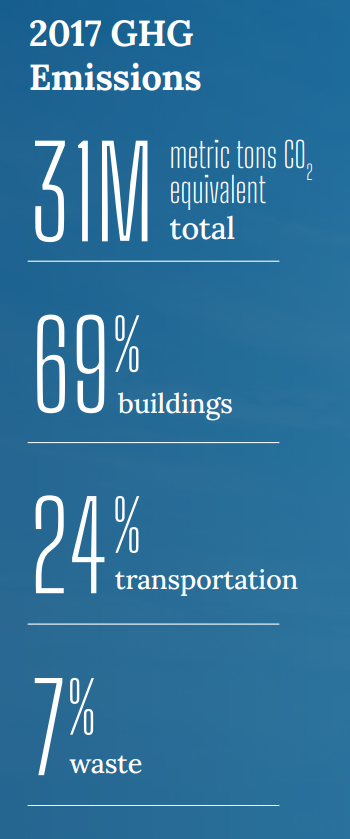Electrify Chicago
An independent tool for viewing City of Chicago building data
According to the
2022 Chicago Climate Action Plan,
69% of Chicago's emissions come from buildings, making
building emissions our biggest challenge and our biggest opportunity as a city
to tackle climate change. At Electrify Chicago, we showcase building performance using
publicly available data supplemented by community-submitted photographs and building
owners.
Start by looking at Chicago's buildings with the highest greenhouse gas intensity i.e. emissions per square foot. Large, efficient, buildings can perform much better than very inefficient small buildings on this metric.
New Article
📰 $30 Million In Missed Fines
The City Of Chicago failed to collect $30 million in potential fines from the building benchmarking ordinance, reducing transparency and accountability.
Legislative update! 🎉
As of late January 2024, legislation is being introduced to require new use more efficient forms of water and space heating, via the Clean And Affordable Buildings Ordinance (CABO), which will reduce the number of highly polluting and inefficient buildings that end up on this site.
If you're in Chicago,
write to your alderman to support the CABO!
Chicago Buildings by Greenhouse Gas Intensity
Note: Data includes large Chicago buildings with data from 2022, unless explicitly stated otherwise.
Note: This data only includes buildings whose emissions are reported
under the
Chicago Energy Benchmarking Ordinance. According to the City “As of 2016,
this list includes all commercial, institutional, and residential buildings larger than
50,000 square feet.” This dataset is also then filtered to only buildings with
reported emissions > 1,000 metric tons CO2 equivalent.
The latest year of data is from 2022, but we update the site regularly when new data is available, and some buildings may have failed to report that year, and only have older data available.
| Property Name / address | Primary Property Type |
Greenhouse Gas Intensity (kg CO2 eq./sqft) |
Total Greenhouse Emissions (metric tons CO2 eq.) |
|---|---|---|---|
|
1340 N DEARBORN ST
1340 N DEARBORN ST
| Multifamily Housing | 4.2 kg/sqft
Lowest 12%
| 453 tons
Lowest 22%
|
|
Roscoe Building
🕰️
434 436 W ROSCOE ST
| Multifamily Housing | 4.2 kg/sqft | 304 tons |
|
517 525 W BROMPTON AVE
517 525 W BROMPTON AVE
| Multifamily Housing | 4.2 kg/sqft
Lowest 12%
| 219 tons
Lowest 3%
|
|
Hale Lofts
14 N Peoria Street
| Multifamily Housing | 4.1 kg/sqft
Lowest 11%
| 449 tons
Lowest 22%
|
|
Francisco
4011 N Francisco Avenue
| Multifamily Housing | 4.1 kg/sqft
Lowest 11%
| 224 tons
Lowest 3%
|
|
KLEO Art Residences
5504 S Michigan Ave
| Multifamily Housing | 4.1 kg/sqft
Lowest 11%
| 349 tons
Lowest 12%
|
|
3833 N Broadway
3833 N Broadway
| Multifamily Housing | 4.1 kg/sqft
Lowest 11%
| 703 tons
Lowest 40%
|
|
Optima Signature Apartments
220 E Illinois St
| Multifamily Housing | 4.1 kg/sqft
Lowest 11%
| 3,540 tons
Highest 10%
|
|
Peterson Lofts Condominium Association
523 S Plymouth Ct
| Multifamily Housing | 4.1 kg/sqft
Lowest 11%
| 336 tons
Lowest 11%
|
|
Lunt Lake Cooperative Apartments
1122-40 W Lunt Ave
| Multifamily Housing | 4.1 kg/sqft
Lowest 11%
| 459 tons
Lowest 22%
|
|
Catholic Charities Saint Alibe - (Faith Apartments)
1244 East 93rd Street
| Multifamily Housing | 4.1 kg/sqft
Lowest 11%
| 734 tons
Lowest 42%
|
|
John Hancock College Preparatory High School
🕰️
(CPS)
4034 W 56th St
| K-12 School | 4.1 kg/sqft | 696 tons |
|
Carl Sandburg Village Condo Association #2
1455 - 1460 N Sandburg Ter
| Multifamily Housing | 4.1 kg/sqft
Lowest 11%
| 3,205 tons
Highest 12%
|
|
1919 S MICHIGAN AVE
1919 S MICHIGAN AVE
| Multifamily Housing | 4.1 kg/sqft
Lowest 11%
| 242 tons
Lowest 4%
|
|
Central Arts Building
730 N Franklin St
| Office | 4.1 kg/sqft
Lowest 11%
| 416 tons
Lowest 18%
|
Data Source:
Chicago Energy Benchmarking Data
